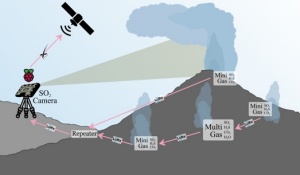Developing a volcanic degassing monitoring network
By: Émilie Saucier (esaucier@buffalo.edu)
Advisor: Stephan Kolzenburg, PhD
Earth Science Department
Project Objetives
• Degassing at volcanoes occurs through multiple pathways which are hypothesized to each preserve different permeability at different times
• To measure this spatio-temporal variation in degassing, we need to build a network of gas sensors
Data and Results
• To learn how to properly build this network of gas sensors, I attended GEARs workshop where I got a crash course of field electronics and mechanics for geoscientist.
• Development of core code for these sensors has now been written
• Conceptual design of the network is complete
• Parts have been picked and purchased
• Testing for the network has been designed
Significance
•This Gas Sensor Network will allow to capture spatiotemporal degassing data which would otherwise require a much higher financial commitment
• Next step is complete the testing of the network and deploy it a volcanoes as well as publish it so that other scientist may replicate it.
Publication or Conference:
Results will be presented at AGU25

Schematic of volcanic gas monitoring network including Mini-Gas, Multi-Gas, SO2 Camera, repeater, and information on how they transmit data.